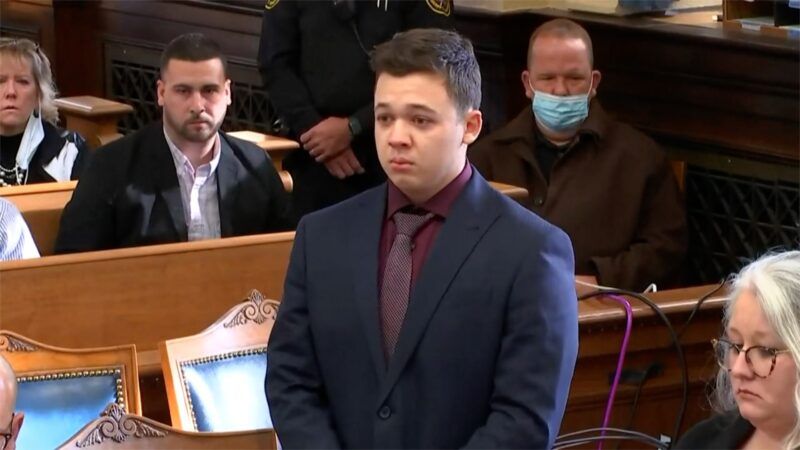The ACLU Thinks Kyle Rittenhouse's Civil Liberties Got Too Much Protection
The American Civil Liberties Union should not cavalierly take the side of prosecutors against the concept of self-defense.

Kyle Rittenhouse, the 17-year-old who shot and killed two men during the riots in Kenosha, Wisconsin, last summer, was acquitted on Friday. Prosecutors had charged him with first-degree reckless homicide, first-degree intentional homicide, attempted first-degree intentional homicide, and two counts of first-degree recklessly endangering safety, but the jury was persuaded by Rittenhouse's argument that he acted in self-defense.
For anyone who had followed the trial closely, this outcome is unsurprising. The prosecution simply did not meet its burden of proof, and Rittenhouse's defense team presented considerable evidence that he reasonably feared for his life each time he pulled the trigger. A witness testified that Joseph Rosenbaum, the first man shot by Rittenhouse, had threatened Rittenhouse's life and was attempting to wrest control of Rittenhouse's AR-15. The second man, Anthony Huber, struck Rittenhouse with a skateboard. And the third man—Gaige Grosskreutz, who survived—admitted on the stand that he had first pointed his own gun at Rittenhouse; Rittenhouse shot him in response to this perceived threat. As former Rep. Justin Amash (L–Mich.) put it: "The Rittenhouse case was a clear case of self-defense based on the evidence presented. The initial media narrative was false. Justice prevailed."
Indeed, people who did not follow the trial closely, and instead relied on secondhand punditry from liberal media figures, probably missed some very basic facts about the case, including that it had little to do with race: Rittenhouse and all three of his victims were white. This is an important point that some mainstream media coverage continues to miss. At MSNBC, for instance, Ja'han Jones, a writer for show host Joy Reid's blog, reacted to the verdict by explicitly saying Rittenhouse's whiteness produced the acquittal:
The case had the makings of an acquittal before the trial even began. The outcome seemed clear even before an almost exclusively white jury pool was selected, even before Judge Bruce Schroeder created an uproar by ruling that the slain protesters could be referred to as "rioters" and "looters" but not "victims," even before Schroeder refused to punish Rittenhouse for what prosecutors said amounted to a violation of his bond conditions. Rittenhouse is a white teen who abides by white rules, and white people empathetic to those rules seemed poised to insulate him from repercussions.
Rep. Cori Bush (D–Mo.) described the verdict as "white supremacy in action":
The judge. The jury. The defendant.
It's white supremacy in action.
This system isn't built to hold white supremacists accountable. It's why Black and brown folks are brutalized and put in cages while white supremacist murderers walk free.
I'm hurt. I'm angry. I'm heartbroken.
— Cori Bush (@CoriBush) November 19, 2021
The accounts of former quarterback Colin Kaepernick and the Black Lives Matter movement made similar statements. These remarks all reek of ignorance: A jury acquitting a white defendant for killing two white men is hardly an example of white supremacy.
Perhaps it's not surprising that activists and Democratic politicians would reflexively cite white supremacy in a trial outcome that disappoints Team Blue. More troubling is the response to the verdict from an organization that should know better: the American Civil Liberties Union (ACLU). In a statement reacting to the verdict, ACLU-Wisconsin Interim Executive Director Shaadie Ali lamented the "deep roots of white supremacy" in Kenosha that prevented Rittenhouse from being "held responsible for his actions."
"Kyle Rittenhouse was a juvenile who traveled across state lines on a vigilante mission, was allowed by police to roam the streets of Kenosha with an assault rifle and ended up shooting three people and killing two," said Brandon Buskey, director of the ACLU's Criminal Law Reform Project. "These are the simple, tragic facts. His acquittal comes after an ACLU investigation exposing how Kenosha law enforcement used violence against protesters and drove them toward white militia groups, in ways that escalated tensions and almost certainly led to these shootings."
In a Twitter thread, the ACLU complained that Rittenhouse was not held accountable for his "conscious decision to travel across state lines and injure one person and take the lives of two people protesting the shooting of Jacob Blake by police."
Of course, it is not illegal to travel across state lines; the fact that Rittenhouse wandered outside the boundaries of his home and entered a neighboring municipality was irrelevant to the case. The jury did not agree with—and the facts of the case did not support—the claim that his decision to shoot three people was "conscious" in the sense that it was premeditated. He argued that he rationally believed his life was in imminent danger, and the surviving shooting victim provided testimony that supported this argument.
One might have expected that an organization dedicated to the preservation of civil liberties would not so cavalierly take the side of prosecutors against the concept of self-defense. In the past, the ACLU has done terrific work shining a light on prosecutorial misconduct—the tremendous power the state has to stack the deck against defendants. The ACLU purports to believe that all people, even the guilty, deserve due process protections. The organization is evidently outraged by the verdict: Is the ACLU outraged that the prosecutor tried to argue that Rittenhouse exercising his Miranda rights was evidence of his guilt?
It is not necessary to elevate Rittenhouse to hero status, or to agree with his very poor decision to involve himself in the Kenosha riots, to accept that the prosecution failed to prove the charges against him. Rittenhouse is now a free man—not because of white supremacy, or because the criminal justice system failed. Activists, politicians, and media figures who purport to care about civil liberties should work toward empowering other defendants to avail themselves of due process, rather than complain that in this one case, the prosecutors did not get its way.


Show Comments (608)